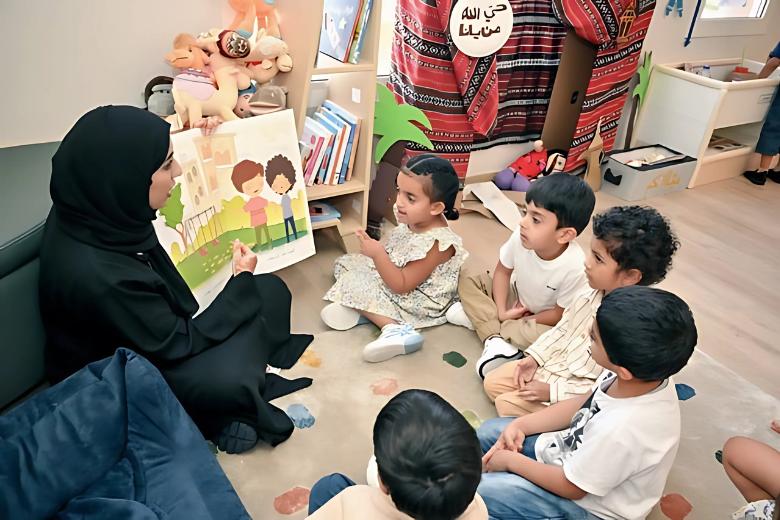Abu Dhabi, 9 June 2025 – In a decisive step toward strengthening cultural identity and early education, the Abu Dhabi Department of Education and Knowledge (ADEK) has introduced the ADEK Arabic kindergarten policy, mandating structured Arabic instruction across all private and charter kindergartens in the emirate.
Beginning Fall 2025, children from Pre-KG to KG2 will receive 240 minutes of Arabic per week as part of the newly launched ADEK School KG Arabic Curriculum Policy. By the 2026–27 academic year, this will increase to 300 minutes weekly. Whether a child is a native speaker or encountering Arabic for the first time, this policy ensures they are grounded in the language that connects them to their culture, heritage, and future.
Why the ADEK Arabic Kindergarten Policy Matters
The move goes far beyond language acquisition. ADEK’s approach aims to nurture identity, belonging, and emotional development during a child’s most formative years. As studies consistently show, early childhood is the most effective period for learning languages — and Arabic is not merely a subject, it’s a bridge to identity, values, and stories that shape who we are.

A recent ADEK survey revealed that while Arabic is often spoken at home, many children still lack confidence using it daily. The new policy seeks to bridge that gap — making Arabic learning interactive, inclusive, and joyful.
Two Tracks, One Vision
The ADEK Arabic kindergarten policy introduces a dual-track system:
- Track One: Designed for native Arabic speakers, this path deepens mother-tongue fluency.
- Track Two: Tailored for non-native speakers and newcomers, this ensures inclusive, level-appropriate learning.
Lessons will centre on storytelling, play, songs, and hands-on exploration, transforming Arabic from a formal lesson into an everyday language of communication and creativity.
Training, Tools, and Family Engagement
To ensure quality, specially trained teachers will deliver age-appropriate lessons using modern resources. Schools will also be supported with guidance and toolkits to involve families in the learning journey — from Arabic storytime to themed events and home-based word games.
“This is about more than just adding Arabic lessons,” said Mariam Al Hallami, Executive Director, Early Education at ADEK.
“It’s about giving every child in Abu Dhabi the gift of language, identity, and connection starting from day one. We want Arabic to feel natural, interactive and alive in every classroom and every home.”
Building on Early Education Momentum
This policy is an essential link between Arabic instruction in nurseries, as guided by ADEK’s Early Education Institutions (EEI) policies, and the formal Arabic curriculum in Cycle 1 under the Ministry of Education. The result is a seamless progression in language development from nursery to primary years.
Timeline at a Glance
- Fall 2025: 240 minutes/week Arabic instruction begins in all KG classrooms
- 2026–27: Instruction increases to 300 minutes/week
- Ongoing: Two tracks for native and non-native speakers + family engagement tools
A Language to Live, Not Just Learn
With the launch of the ADEK Arabic kindergarten policy, Arabic is no longer treated as an isolated subject. It becomes part of how children play, interact, express, and belong. It’s a vital part of ADEK’s long-term vision — making Arabic a lived experience for the next generation of learners.
For more information, visit the ADEK website below:
About Abu Dhabi Department of Education and Knowledge (ADEK)
The Abu Dhabi Department of Education and Knowledge (ADEK) is the Education Sector regulator across the Emirate. It oversees and provides services throughout a learner’s journey from early education to university and beyond. It also champions inclusivity for People of Determination in the mainstream schooling system and by providing specialized schools.
Across Early Childhood and K-12, ADEK licenses and regulates nurseries and private schools in Abu Dhabi while also legislating, mandating, and managing its own Charter Schools and 2 schools for People of Determination.
ADEK also annually provides distinguished Abu Dhabi students with full scholarships and support to study at the best universities around the world. In addition, the Department audits and enhances the delivery of Higher Education in Abu Dhabi, attracting Higher Education Institutions to open the required Program or schools that serve Abu Dhabi’s needs while championing a student and faculty-friendly ecosystem in the Emirate.
With a vision to Empower Education. Empower Minds. Empower the Future, ADEK recognizes that every learner is different, and a diversity of teaching methods are essential for students to succeed. To that effect, ADEK partners with stakeholders to enable a great education system to flourish in Abu Dhabi and nurture future-ready graduates who have the 21st-century skills required to sustain and carry forward Abu Dhabi’s vision.
Further Reading:












